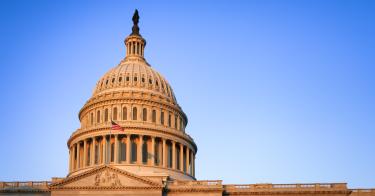When President Donald Trump came into office, he promised to fundamentally change how the federal government operates – and to cut it down to a much smaller size. His first budget proposal listed 19 "zombie" agencies that should be eliminated entirely.
Last month, the president released his second budget request. The list had shrunk from 19 to 15.
Worse, Congress has taken no action to cut any of these programs. And in his most recent budget, the president actually called for one program, the Overseas Private Investment Corporation, to expand significantly.
Why? The government being on auto-pilot doesn't help. For more than two decades, Congress has failed to follow any semblance of a normal budget process, allowing the size of the federal government to swell, and wasting billions of taxpayer dollars.
The "zombie" programs range from development agencies such as the Appalachian Regional Commission, Delta Regional Authority, and Denali Commission, to arts-focused agencies such as the National Endowment for the Arts, National Endowment for the Humanities, and Institute of Museum and Library Services.
The list also includes the Legal Services Corporation, the United States Institute of Peace, and withdrawing federal subsidies from the Woodrow Wilson Center.
But wait, you may say – some of those programs do good work. That may be true in some cases, but the point is that none of them are core constitutional responsibilities of the federal government. The public would be better served if they were funded and administered by state and local governments, or by the private sector.
Indeed, some of these agencies duplicate private efforts, which means the federal government's subsidies (i.e., taxpayer money) have little positive impact.
For example, the National Endowments for the Arts and Humanities received around $300 million in funding last year. However, charitable contributions to the arts and humanities totaled more than $18 billion. Another agency, the Woodrow Wilson Center, states on its own website that it could continue to operate without annual federal funding. Why not let them?
So why has there been no movement by Congress to follow through on the president's budget requests and actually eliminate funding for these programs?
Part of the reason is that many of these agencies have constituencies among liberals and conservatives alike. Take the Appalachian Regional Commission, which was proposed for elimination in Trump's first budget but not his second. Senate Majority Leader Mitch McConnell has strong ties to the region, and a current member of his staff has been nominated to co-chair the commission.
However, the real reason that these and other programs enjoy perpetual funding is the complete breakdown of the congressional budget process.
This includes not only passing budgets and appropriations bills, but also authorizing the programs that receive funding. In 2016 alone, there were more than $310 billion provided to programs that had never been authorized by Congress or whose authorizations had expired. The last time that Congress actually passed each individual appropriations bill by the start of the fiscal year was 1994.
You may be wondering why this matters, so long as the government continues to operate. The authorization and appropriations process provides Congress with regular opportunities to carefully examine and evaluate the activities that it is funding. It should be a time to vigorously debate spending priorities and assess the goals and effectiveness of programs.
When the budget process is ignored, this opportunity is squandered. Instead, we are left with bloated spending bills passed under self-created crisis and filled with waste. There is little to no opportunity for amendment and debate, allowing programs to continue year after year, whether they are appropriate or not.
True, these programs make up only a small percentage of the budget, and eliminating them all would have little impact on deficit and debt levels. But that's not the point. How is Congress ever going to tackle the major reforms needed to programs such as Social Security, Medicare and Medicaid if it is unwilling to make even these minor cuts?
The country is more than $20 trillion in debt. It is past time for Congress to start being better stewards of taxpayers' money, instead of driving the country closer to the brink of a fiscal breakdown. They can begin by putting zombie programs down.
This piece originally appeared in the Sacramento Bee



